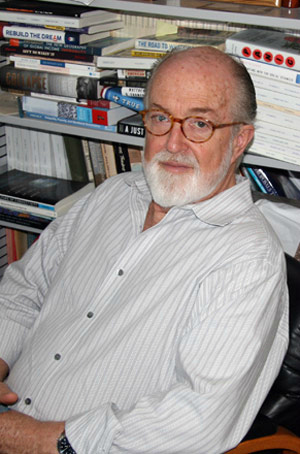Campus News
With marijuana legalization on the ballot, lessons learned from Dutch drug policy
As California and several other states vote on marijuana legalization initiatives next month, a new article by emeritus professor of sociology Craig Reinarman compares Dutch and U.S. drug policies.

As California and several other states vote on marijuana legalization initiatives next month, a new article by emeritus professor of sociology Craig Reinarman compares Dutch and U.S. drug policies.
“Dutch drug policy has opened to empirical examination what has until recently too often remained unquestioned drug war orthodoxy,” Reinarman writes in Criminology & Public Policy. Reinarman, who has devoted most of his career to studying various aspects of drugs and drug policy, looks at how the Dutch have managed cannabis use with few problems and little policing.
“Drug policies must be evaluated on the basis of their actual consequences,” he says.
To better understand cannabis legislation in the Dutch context, Reinarman contextualizes the history of the country’s drug policy with the country’s legal culture. Tolerance, reducing police power, and keeping lawbreakers out of prison when possible underscores their legal system. Informal social control is preferred.
When two Dutch national commissions showed cannabis experimentation common and addiction rare, policymakers paid close attention, he said. Moreover, they understood that punishment would stigmatize and marginalize users.
The Dutch Prosecutors General decided it was not practical to enforce laws against the drug. In 1976, the Dutch Opium Act allowed cannabis sales in a regulated market that resulted in tighter social controls, Reinarman writes.
Meanwhile in the U.S., Reinarman points to evidence from the Center for Addiction and Substance Abuse that found it is easier for many high school students to obtain illegal marijuana than it is to access legal but regulated substances like tobacco, alcohol, or prescription drugs.
“For a century, the United States has pursued drug policies designed to deter use by stigmatizing, punishing, and ostracizing users,” Reinarman writes.
Problematically, criminalization only amplifies inequality. Marginalized groups are pushed deeper into illicit spaces. A lower cost of entry and higher income than in the legal economy makes it appealing when life choices are constrained.
In the Netherlands, drug policy keeps users inside the legal system. Compared to the U.S., there is also a stronger welfare state, health care system, and social housing. There is also substantially less poverty and addiction and crime rates are lower.
“In thinking about U.S. drug policy, my Dutch colleagues often use a “stopped-up sink” metaphor: “Americans keep feverishly mopping up the floor, but the faucet is still running.”
Reinarman is the author of Crack in America: Demon Drugs and Social Justice (University of California Press, 1997), American States of Mind: Political Beliefs and Behavior (Yale University Press, 1987), and editor of Expanding Addiction: Critical Essays (Routledge, 2014).